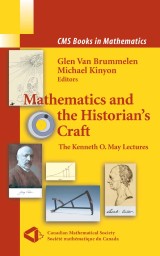Details

Mathematics and the Historian's Craft
The Kenneth O. May LecturesCMS Books in Mathematics
|
96,29 € |
|
| Verlag: | Springer |
| Format: | |
| Veröffentl.: | 18.06.2006 |
| ISBN/EAN: | 9780387282725 |
| Sprache: | englisch |
| Anzahl Seiten: | 358 |
Dieses eBook enthält ein Wasserzeichen.
Beschreibungen
Introduction: The Birth and Growth of a Community.- History or Heritage? An Important Distinction in Mathematics and for Mathematics Education.- Ptolemy’s Mathematical Models and their Meaning.- Mathematics, Instruments and Navigation, 1600–1800.- Was Newton’s Calculus a Dead End? The Continental Influence of Maclaurin’s Treatise of Fluxions.- The Mathematics and Science of Leonhard Euler (1707–1783).- Mathematics in Canada before 1945: A Preliminary Survey.- The Emergence of the American Mathematical Research Community.- 19th Century Logic Between Philosophy and Mathematics.- The Battle for Cantorian Set Theory.- Hilbert and his Twenty-Four Problems.- Turing and the Origins of AI.- Mathematics and Gender: Some Cross-Cultural Observations.
<P>Kenneth Ownsworth May (1915-1977) was a brilliant and influential mathematician, historian, and educator who founded the journal Historia Mathematica as well as the Canadian Society for the History and Philosophy of Mathematics. He viewed the practice of the history of mathematics as a unique melding of the crafts of mathematician and historian. This entails sensitivity to the mathematical content of the subject and to the various contexts in which it can be understood. Mathematical practitioners, for pedagogical reasons or to contextualize their own work, tend to focus on finding the antecedents for current mathematical theories in a search for how particular subdisciplines and results came to be as they are today. On the other hand, historians of mathematics bypass the current state of affairs, and are more interested in questions that bear on the changing nature of the discipline itself. The papers contained in this volume exhibit 12 outstanding examples of historians approaching their craft in distinct ways, yet consistent with Kenneth May's vision. Each paper is based on a keynote address, known as the Kenneth O. May Lecture, delivered at the annual meeting of the Canadian Society for the History and Philosophy of Mathematics. </P>
<P></P>
<P>This volume includes the following contributions:</P>
<P></P>
<P>* Ivor Grattan-Guinness, History or Heritage? An Important Distinction in</P>
<P>Mathematics and for Mathematics Education</P>
<P>* Alexander Jones, Ptolemy's Mathematical Models and their Meaning</P>
<P>* Jim Bennett, Mathematics, Instruments and Navigation, 1600-1800</P>
<P>* Judith Grabiner, Was Newton's Calculus a Dead End? The Continental Influence</P>
<P>of MacLaurin's Treatise of Fluxions</P>
<P>* Rüdiger Thiele, The Mathematics and Science of Leonhard Euler (1707-1783)</P>
<P>* Thomas Archibald and Louis Charbonneau, Mathematics in Canada before 1945: A</P>
<P>Preliminary Survey</P>
<P>* Karen Parshall, The Emergence of the AmericanMathematical Research Community</P>
<P>* Volker Peckhaus, 19th-Century Logic Between Philosophy and Mathematics</P>
<P>* Joseph Dauben, The Battle for Cantorian Set Theory</P>
<P>* Rüdiger Thiele, Hilbert and His Twenty-Four Problems</P>
<P>* Stuart Shanker, Turing and the Origins of AI</P>
<P>* Anne Hibner Koblitz, Mathematics and Gender: Some Cross-Cultural Observations</P>
<P></P>
<P>This volume includes the following contributions:</P>
<P></P>
<P>* Ivor Grattan-Guinness, History or Heritage? An Important Distinction in</P>
<P>Mathematics and for Mathematics Education</P>
<P>* Alexander Jones, Ptolemy's Mathematical Models and their Meaning</P>
<P>* Jim Bennett, Mathematics, Instruments and Navigation, 1600-1800</P>
<P>* Judith Grabiner, Was Newton's Calculus a Dead End? The Continental Influence</P>
<P>of MacLaurin's Treatise of Fluxions</P>
<P>* Rüdiger Thiele, The Mathematics and Science of Leonhard Euler (1707-1783)</P>
<P>* Thomas Archibald and Louis Charbonneau, Mathematics in Canada before 1945: A</P>
<P>Preliminary Survey</P>
<P>* Karen Parshall, The Emergence of the AmericanMathematical Research Community</P>
<P>* Volker Peckhaus, 19th-Century Logic Between Philosophy and Mathematics</P>
<P>* Joseph Dauben, The Battle for Cantorian Set Theory</P>
<P>* Rüdiger Thiele, Hilbert and His Twenty-Four Problems</P>
<P>* Stuart Shanker, Turing and the Origins of AI</P>
<P>* Anne Hibner Koblitz, Mathematics and Gender: Some Cross-Cultural Observations</P>
The Kenneth May Lectures have never before been published in book form Important contributions to the history of mathematics by well-known historians of science Should appeal to a wide audience due to its subject area and accessibility Includes supplementary material: sn.pub/extras
<P>This book brings together for the first time the Kenneth May Lectures that were given at the annual meetings of the Canadian Society for History and Philosophy of Mathematics. All contributions are of high scholarly value, yet accessible to an audience with a wide range of interests. They provide a historian’s perspective on mathematical developments and deal with a variety of topics covering Greek applied mathematics, the mathematics and science of Leonhard Euler, mathematical modeling and phenomena in ancient astronomy, Turing and the origins of artificial intelligence to name only a few.</P>

















